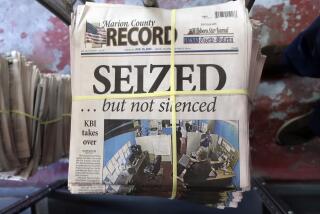Forget New Laws--Fix the Old Ones
- Share via
President Bush would have us believe that new federal laws are what’s necessary to solve the problem of corporate fraud in the United States. Instead, he should have proposed reform of existing federal laws that contributed to the problem in the first place.
Calling for harsher jail sentences for executives convicted of securities fraud sounds tough, but it would have little effect.
The president knows full well that the stiffer sentences would rarely be imposed because corporate executives are so infrequently convicted of securities fraud: It is very difficult to prove--beyond a reasonable doubt--the intent to defraud.
Tougher criminal sanctions are not the solution, but there are many things Bush could do. First, and most important, he must restore the power of investors to sue for civil damages. Second, he must change the federal laws that presented the temptations for executives to commit fraud.
Top executives now receive most of their compensation in the form of stock or stock options. This means they stand to make millions from even a short-term increase in share price. The promise of instant riches presents an overwhelming temptation to misstate earnings.
The dramatic increase in options is not the natural product of market forces but rather the result of federal laws that distort the accounting treatment of executive compensation.
Current federal law permits companies to deduct the cost of options on their tax returns while not disclosing this cost on the earnings statements they provide to shareholders.
This government-sanctioned financial misstatement has encouraged outrageous options grants by enabling companies to effectively pay executives millions “free”--at least as far as the shareholders are told.
European countries do not account for options grants in the way the U.S. usually does. As a result, executives of European companies receive more compensation in cash and thus do not face the temptation to distort share price.
Bush, however, continues to resist any effort to reform this government-sanctioned accounting distortion.
Federal law also exacerbated the current situation by removing the central impediments to securities fraud. Government regulators alone cannot deter fraud. Effective deterrence requires that shareholders--the victims of the fraud--be able to sue those who perpetrate fraud.
Historically, executives contemplating fraud did face a serious risk of being sued by shareholders. These suits not only helped deter fraud and compensate victims, they also helped bring potential wrongdoing to the attention of government regulators.
But in the mid-1990s, Congress not only adopted legislation making it much more difficult to bring securities fraud actions, it granted executives the right to seek dismissal before the shareholder had access to “discovery,” a court- supervised process to facilitate plaintiff investigation of corporate wrongdoing.
Denying discovery is unusual. In other areas, plaintiffs are permitted to use the power of the courts to investigate wrongdoing. The denial of discovery not only hurts private plaintiffs but also hurts government enforcement efforts because regulators previously benefited from the information gleaned by private plaintiffs about securities fraud.
Congress went beyond altering federal law and also intervened to prevent shareholders from suing for damages for securities fraud under state law. This legislation undercutting states’ efforts was adopted by the very Republican-led Congress that in other areas had championed states’ rights.
Deterring securities fraud requires removal of these impediments to litigation.
Shareholders should be permitted to sue for securities fraud and should be given time to investigate wrongdoing. They also should be permitted discovery if there is credible evidence of potential securities fraud.
The law should be changed to ensure that the responsible executives bear the financial burden of their frauds, as opposed to liability being imposed on the corporation itself, and thus on the very shareholders injured by the fraud.
Finally, greater disclosure by management of its trading activity is necessary. This would reduce the gain to executives from trading as well as enable the markets to examine management’s own faith in the veracity of its statements.
Current federal law requires only top managers to disclose their trades in company stock, and it permits them to do so long after the trade.
The disclosure requirement must be extended to all executives with substantial stockholdings in a firm. Executives should be required to reveal on an electronic database accessible to the public any potential trades 24 hours before they do them. This would enable investors to compare an executive’s personal behavior with the executive’s statements--before the executive is able to profit from them.
Establishing these necessary reforms, however, would require that Bush be serious about deterring fraud even at the expense of executives’ huge profits.
He is not.
And so we must gird ourselves for additional problems.
More to Read
Inside the business of entertainment
The Wide Shot brings you news, analysis and insights on everything from streaming wars to production — and what it all means for the future.
You may occasionally receive promotional content from the Los Angeles Times.










